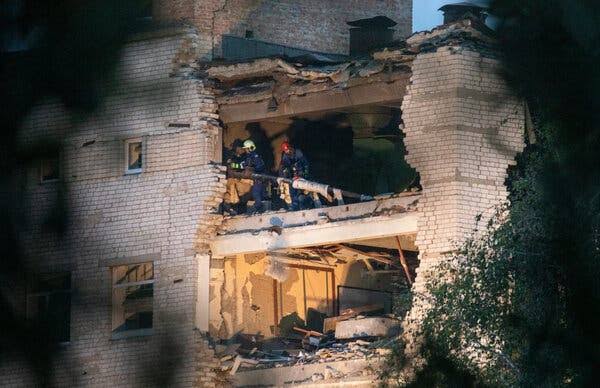Poltava, Ukraine – September 3, 2024: A devastating missile strike by Russian forces has left more than 50 people dead and over 200 wounded in the central-eastern Ukrainian city of Poltava. The attack, one of the deadliest since the start of Russia’s full-scale invasion over 900 days ago, targeted a military academy and a nearby hospital, reducing parts of the Poltava Military Institute of Communication to rubble.
Two ballistic missiles struck the heart of the institute’s main building on Tuesday, causing several stories to collapse. The blast reverberated through the city, sending shockwaves far beyond the immediate vicinity of the explosion. Within minutes, the acrid smell of smoke filled the air, and news of the catastrophic event began to spread rapidly.
Ukrainian President Volodymyr Zelenskyy, in a somber address to the nation, described the aftermath as “traumatic and nightmarish.” He confirmed that rescue operations were underway, with many survivors being pulled from beneath the debris. “People found themselves under the rubble. Many were saved,” Zelenskyy said in a video message on Telegram, announcing the launch of a full investigation into the incident.
As night fell over Poltava, the full extent of the damage became clear. Shattered bricks and pools of blood marked the site of the attack, while broken glass from nearby apartment windows littered the streets. The area surrounding the institute was cordoned off, with field communication trucks stationed along the perimeter, and the mood in the city was one of shock and grief.
Eyewitnesses recounted the horror of the strike. Yevheniy Zemskyy, a local resident who rushed to the scene to volunteer, described the fear and confusion that gripped the city. “I heard explosions … I was at home at that time. When I left the house, I realized that it was something evil and something bad,” he said, expressing his concern for the children and residents of Poltava. “That’s why we are here today, to help our city in any way we can.”
By the evening, Ukrainian officials had confirmed a death toll of 51, with fears that the number could rise as up to 18 people remained trapped under the rubble. The regional governor, Filip Pronin, provided further details, revealing that 219 people had been injured in the attack. He also announced that ten apartment buildings had sustained damage, with more than 150 residents stepping forward to donate blood for the injured.
“This is a great tragedy for the Poltava region and for all of Ukraine,” Pronin said, declaring three days of mourning starting Wednesday. The first lady of Ukraine, Olena Zelenska, expressed her sorrow on social media, calling the missile strike “a shocking tragedy for the whole of Ukraine.”
International condemnation was swift. The White House denounced the attack, with National Security Communications Advisor John Kirby describing it as “another horrific reminder of Putin’s brutality towards the people of Ukraine.” He emphasized the urgent need to bolster Kyiv’s air defenses and promised that more military aid would be on its way in the coming weeks. British Foreign Secretary David Lammy condemned the strike as a “sickening act of aggression,” while German Foreign Minister Annalena Baerbock stated that Putin’s brutality “knows no limits.”
The Poltava Military Institute of Communication, a key facility in Ukraine’s defense infrastructure, has been instrumental in training officers in communications and electronics—a critical skill set in the ongoing conflict where control of the electronic battlefield is fiercely contested. The deliberate targeting of the academy suggests a calculated attempt by Russian forces to undermine Ukraine’s military capabilities.
While the Kremlin remained silent on the strike, the incident has added to the growing list of Russian attacks on civilian and military infrastructure in Ukraine. Previous assaults include the 2022 airstrike on a theater in Mariupol that killed hundreds of civilians and the attack on a train station in Kramatorsk that claimed 61 lives. The use of missiles to target civilian areas has drawn widespread international condemnation and fueled calls for more robust defensive measures for Ukraine.
The missile strike occurred just as Ukrainian forces were engaged in an ongoing operation in Russia’s Kursk border region, following a surprise incursion in early August. Ukrainian Defense Ministry officials described the timing of the attack as “barbaric,” noting that the missiles struck shortly after an air-raid alert had been issued, when many people were en route to bomb shelters.
Rescue teams worked tirelessly throughout the day, managing to save 25 people from the wreckage, including 11 who were extricated from beneath the collapsed building. The Defense Ministry praised the efforts of the first responders but reiterated the need for greater international support.
President Zelenskyy renewed his appeal for Western nations to expedite the delivery of air defense systems and other military aid, stressing the urgency of the situation. “Ukraine needs air defense systems and missiles now, not sitting in storage,” Zelenskyy wrote on Telegram. “Long-range strikes that can protect us from Russian terror are needed now, not later. Every day of delay, unfortunately, means more lost lives.”
As the dust settles in Poltava, Ukraine braces for what comes next. The memory of this tragedy will linger long after the last brick is cleared, serving as a grim reminder of the ongoing war that continues to devastate the lives of countless Ukrainians.




